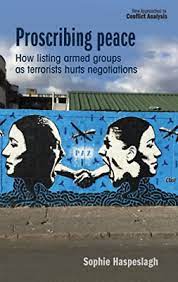Proscribing peace
how listing armed groups as terrorists hurts negotiations
- ISBN: 9781526171566
- Editorial: Manchester University Press
- Fecha de la edición: 2023
- Lugar de la edición: Manchester. Reino Unido
- Colección: New Approaches to Conflict Analysis
- Encuadernación: Rústica
- Medidas: 24 cm
- Nº Pág.: 240
- Idiomas: Inglés

Proscribing peace offers a systematic examination of the impact of proscription on peace negotiations. By introducing the concept of 'linguistic ceasefire', Haspeslagh adds to our understanding of the timing and sequencing of peace processes in the context of proscription. With relevance for more than half of the conflicts around the world in which an armed group is listed as a terrorist organisation, 'linguistic ceasefire' helps to explain why certain conflicts remain stuck in the 'terrorist' framing, while others emerge from it. International proscription regimes criminalise both the actor and the act of terrorism. Proscribing peace calls for an end to the amalgamation between acts and actors. By focussing on the acts instead, Haspeslagh argues, international policy would be better able to consider the violent actions both of armed groups and those of the state. By separating the act and the actor, change - and thus peace - become possible.
1 Tying the act to the actor: a short history of international proscription
2 International proscription regimes: material and symbolic effects
3 Proscription and pre-negotiations: the importance of the‘linguistic ceasefire
4 The linguistic ceasefire
5 Proscription and power
6 Revisiting ripeness
7 The effect of proscription in ColombiaConclusion: proscribing peace






